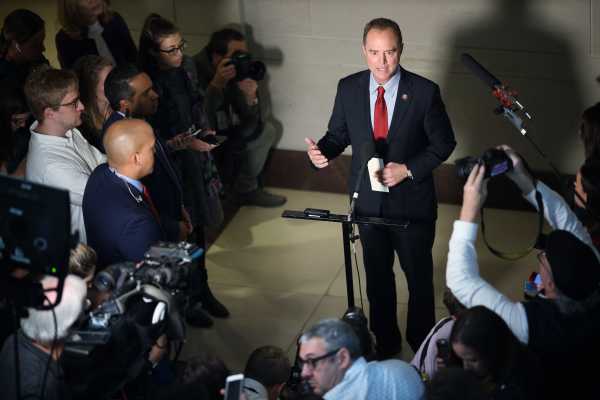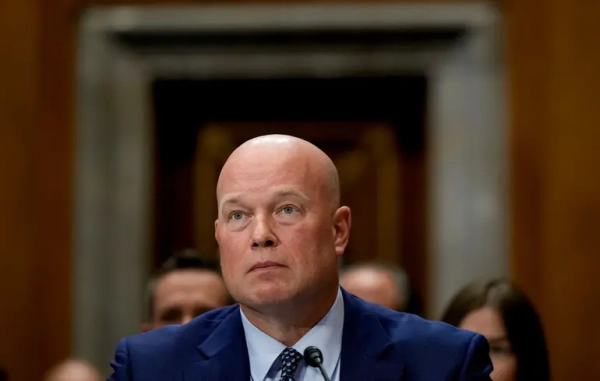
It’s a busy, hearing-packed week for the US House of Representatives as members come back from a two-week recess to continue their impeachment inquiry into President Donald Trump.
Members of the House Intelligence Committee never really left Capitol Hill during recess. Lawmakers in that committee — along with members of the two other committees investigating Trump’s contacts with Ukraine, the foreign affairs and oversight committees — have spent the last two weeks conducting hearings and deposing witnesses in order to determine whether Trump attempted to use the office of president to gain dirt on his political enemies.
So far, these sessions have revealed text messages that appear to support the allegations of a whistleblower who accused Trump of attempting to coerce Ukraine into investigating former Vice President Joe Biden. The hearings have also raised new questions about the involvement of private citizens in official US foreign policy, including Trump’s personal lawyer Rudy Giuliani.
At least four former and current Trump administration officials are testifying in front of lawmakers this week. First up is Fiona Hill, a former National Security Council adviser on Russia. Hill is expected to give her perspective on what the council did and didn’t know about the July 25 call Trump had with Ukrainian President Volodymyr Zelensky in which Trump asked his Ukrainian counterpart to investigate Biden.
As lawmakers proceed with these hearings, the committees are also waiting to hear back on whether administration officials will respond to a fresh round of subpoenas issued last week.
Here’s everything you need to know to get up to speed on another dizzying week of news in Washington.
The week in hearings, explained
Here’s what we know so far about the impeachment inquiry hearings scheduled so far this week:
Monday, October 14
- Fiona Hill, Trump’s former top adviser on Russia, is appearing in a closed-door session before the House Intelligence, Foreign Affairs, and Oversight Committees. Hill was a career official who served across six administrations and is not considered a Trump loyalist. She abruptly left the National Security Council about a week before Trump’s July 25 call with Zelensky. Hill is expected to testify about how the National Security Council was largely in the dark about the activities of other Trump officials and Rudy Giuliani — the president’s personal lawyer — with respect to Ukraine.
- Semyon “Sam” Kislin, an associate of Giuliani, is scheduled to appear for a closed-door deposition with House Intelligence Committee staff.
Tuesday, October 15
- George Kent, deputy assistant secretary of state for Europe and Eurasia, is scheduled to appear for a closed-door deposition. Kent is a career diplomat at the State Department who served in Ukraine from 2015 to 2018. He was supposed to testify earlier but did not show up due to White House pressure.
Wednesday, October 16
- P. Michael McKinley, former senior adviser to Secretary of State Mike Pompeo, is scheduled to be deposed in a closed-door session.
Thursday, October 17
- Former European Union Ambassador Gordon Sondland is scheduled to appear for a closed-door deposition. Sondland was originally supposed to testify October 8, but the Trump administration initially blocked him from appearing. Sondland’s testimony could be a pivotal moment for House Democrats’ investigation, particularly as they work to determine whether Trump wanted to trade US military aid for an investigation into Biden and his son Hunter (we’ll get into that more later).
- Counselor of the United States Department of State T. Ulrich Brechbuhl is scheduled to appear for a closed-door deposition. Brechbuhl is close to Secretary of State Mike Pompeo.
Friday, October 18
- Deputy Assistant Secretary of Defense Laura Cooper is scheduled to appear for a closed-door deposition.
What we’ve learned so far in the impeachment inquiry
Reports over the weekend suggest this week could be another big one for Democrats’ impeachment inquiry, particularly because of what former EU Ambassador Sondland may tell lawmakers and their staff.
The Washington Post reported this weekend Sondland plans to tell Congress that explosive text messages in which the ambassador denied Trump was offering Ukraine a quid pro quo arrangement (the release of congressionally approved military aid in exchange for an investigation into Biden) was simply Sondland relaying a message that Trump told him over the phone.
“It’s only true that the president said it, not that it was the truth,” a source familiar with Sondland’s Thursday testimony told the Washington Post’s Aaron Davis and John Hudson.
If Sondland indeed follows through with that testimony, it could be a watershed moment, precisely because Trump and his White House have used Sondland’s texts to say there was no quid pro quo as a big part of its defense. If it turns out that message originated from the president himself, it could undercut that argument.
By deposing more diplomats and career service officials, lawmakers are starting to paint a fuller picture of the Trump administration’s activities around Ukraine. Last week, lawmakers talked to former US ambassador to Ukraine Marie Yovanovitch for nearly 10 hours. Among other things, Yovanovitch told them she had been ousted from her post in May after a “concerted campaign against me,” led by Giuliani and supported by Trump. Yovanovitch also testified she was targeted for her work on anti-corruption in Ukraine, which she said was interrupting the business interests of some of Giuliani associates in the region.
Giuliani himself is also coming under more scrutiny; last week, CNN reported that prosecutors in the US Attorney’s Office for the Southern District of New York “are examining Giuliani’s involvement in the broader flow of money” involving his Ukrainian associates Lev Parnas and Igor Fruman, who were arrested on charges of violating campaign finance law last week.
It’s a lot to keep up with, but it means that Trump’s personal lawyer seems to be in worsening legal trouble. This tangled web around Ukraine means Trump is only going to face more scrutiny from lawmakers going forward. If evidence keeps mounting that Trump tried to engineer his own defense, that scrutiny could result in articles of impeachment.
Democrats are also pushing ahead with subpoenas this week
Democrats have a lot of subpoena deadlines to follow up on this week; they’re waiting to see if a number of current and former Trump officials will respond to their subpoenas for documents and witnesses.
- It’s worth noting the Trump administration wrote a letter last week saying it won’t comply with any congressional requests and subpoenas related to the impeachment inquiry, so these will likely turn into court battles. However, some of the individuals Congress has requested documents from are not administration officials; they are not subject to the same broad protection of executive privilege and could comply with the subpoenas of their own accord. And some administration officials could — as Yovanovitch did — disregard the White House’s guidance and cooperate as well.
Subpoenas for current/former Trump officials and departments:
- On October 4, congressional committees sent a letter to Vice President Mike Pence requesting a list of documents to examine whether Pence had knowledge of Trump’s July 25 phone call to Zelensky. The White House has said it will not comply.
- Sondland was supposed to provide the House Intelligence Committee documents by October 14, but his attorneys said he cannot provide the documents.
- Pentagon officials are supposed to turn over records to the committees outlining the delay in military aid to Ukraine, with an October 15 deadline.
- Acting Director of the Office of Management and Budget Russell Vought has been asked by the committees to turn over documents on the delay of military aid to Ukraine by the same October 15 deadline.
- Acting White House Chief of Staff Mick Mulvaney was subpoenaed on October 4 for documents related to the impeachment inquiry. He’s supposed to provide the documents by October 18.
- Energy Secretary Rick Perry was subpoenaed on October 10 for documents related to his contact with Ukrainian president Zelensky in May and June. He’s supposed to provide the documents by October 18, but hasn’t yet responded.
Subpoenas for Trump associates who are not administration officials:
- Giuliani was subpoenaed by the House Intelligence Committee on September 30 and ordered to produce documents about his work in Ukraine by October 15. Giuliani has said he won’t comply with the request or testify.
- Lev Parnas and Igor Fruman, two Giuliani associates, were requested to testify before the committees and hand over documents, and committee investigators sent them a formal subpoena on October 10. Parnas and Fruman have so far refused to cooperate with Congress, but they have also been arrested on a separate charge of violating campaign finance laws. Like Giuliani, the two men are exempt from executive privilege protections.
This list shows how wide-ranging the congressional inquiry into Trump and his administration officials’ dealings with Ukraine has become. But with most of these requests, the Trump administration has already refused to provide documents and witnesses, meaning these requests will get tied up in lengthy court proceedings.
So far, Democrats have had the most success with career administration officials who aren’t Trump loyalists. The big question is how many Trump loyalists they can get to talk to them as well.
Sourse: vox.com






